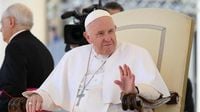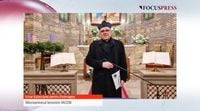Pope Francis passed away this morning, April 21, 2025, after giving his last Urbi et Orbi blessing on Easter Sunday from the Loggia of St. Peter's Basilica. His sudden departure has left the world in mourning, as he was a figure of compassion and mercy, deeply committed to the marginalized and the poor.
The pontificate of Pope Francis, who made history as the first pope from Argentina, was characterized by a profound focus on mercy, fraternity, and care for the environment. His refusal to condone war and his emphasis on the need for a more inclusive Church resonated with many, making him a beloved figure across the globe.
Throughout his papacy, Francis consistently highlighted the evangelical call to mercy, which he described as "the air we breathe." This central theme was evident in his first Angelus message delivered on March 17, 2013, where he recalled the words of an elderly woman who once told him, "The Lord forgives everything... If the Lord did not forgive everything, the world would not exist." This sentiment encapsulated his belief in the necessity of mercy in the Christian faith.
Despite not altering traditional Christian teachings, Pope Francis managed to shift the perception of the Church significantly. He emphasized mercy as the heart of Christianity, portraying a maternal face of the Church that leans towards those who are wounded, especially those hurt by sin. His approach was not merely theoretical; it was deeply practical and personal.
One of the most poignant examples of his ministry was his invitation to the house of Zaheu, a tax collector often regarded as a sinner in his community. Pope Francis illustrated this point by saying, "How many of us deserve condemnation! And it would be right. But He forgives! How? Through mercy that doesn't erase sin: only God's forgiveness erases it, while mercy goes further." This message of unconditional love and acceptance was fundamental to his teachings.
Throughout his years as pope, Francis demonstrated a Church that was capable of tenderness and compassion, welcoming and embracing everyone, regardless of their past. He often spoke about the importance of reaching out to those on the margins of society, embodying the very essence of Christian charity.
In his apostolic exhortation, "Evangelii gaudium," he famously wrote, "I prefer a Church that is bruised, hurt and dirty because it has been out on the streets rather than a Church which is unhealthy from being confined and from clinging to its own security." This statement reflected his desire for a Church that actively engages with the world and addresses its challenges rather than retreating into comfort.
From the beginning of his papacy, Pope Francis showed a profound concern for social issues. He began his pontificate by praying for migrants who had died at sea in Lampedusa, a gesture that highlighted his commitment to those suffering from displacement and injustice. His final moments were spent in a wheelchair, a stark reminder of his humility and dedication to his mission until the very end.
As news of his passing spreads, many are reflecting on his legacy. His call for mercy and compassion has inspired millions, encouraging them to embrace a more loving and forgiving approach to life. His teachings have resonated deeply, especially in a world often marked by division and strife.
In remembering Pope Francis, many will recall the warmth of his smile and the sincerity of his message. His ability to connect with people from all walks of life set him apart as a leader who truly understood the struggles of humanity. Whether addressing global issues like climate change or advocating for the rights of the poor, he consistently urged others to act with kindness and empathy.
In a world that can sometimes feel overwhelmingly negative, Pope Francis served as a beacon of hope. His message was clear: mercy is not just a concept but a necessary part of human existence. It is an invitation to look beyond ourselves and to extend love and forgiveness to others.
As the Catholic Church enters a new chapter without him, the challenge will be to continue his mission of mercy and compassion. The faithful are called to remember his teachings and to embody the spirit of love that he so passionately preached. His passing marks the end of an era, but his legacy will undoubtedly live on through the countless lives he touched.
In conclusion, Pope Francis's life was a testament to the power of mercy. His unwavering commitment to the marginalized and his ability to inspire change will forever be remembered. As the world mourns his loss, it is essential to carry forward his message of love and compassion, ensuring that his vision for a more merciful Church continues to thrive.





